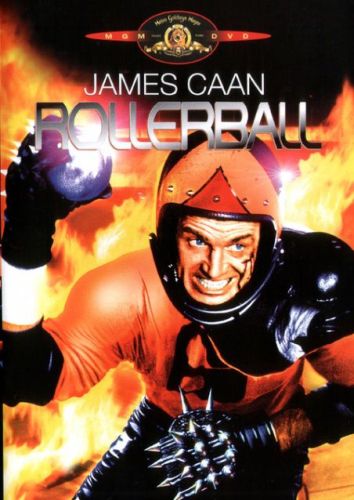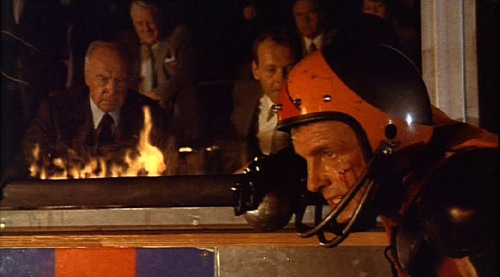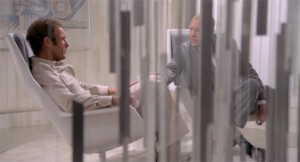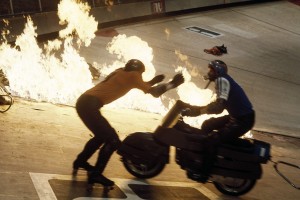From Monthly Film Bulletin, October 1975. — J.R.
Rollerball
U.S.A., 1975 Director: Norman Jewison
A classic demonstration of how several millions of dollars can be
unenjoyably wasted, Rollerball postulates an unlikely future society
from which war, poverty, illness and individual initiative have all
magically vanished, but then resolutely refuses to show it, reserving
all its heavy hardware for the brutal mechanics of an exceedingly
dull sport that is presumed to make this invisible anti-utopia
possible. Featuring a noble savage hero who stumbles clumsily
after an obscure mystery like a donkey running repeatedly into a
brick wall — James Caan reprising his performance in The Gambler
without the literary quotes, in a comparable embodiment of
mindless masochism-and a Sphinx-like villain (John Houseman)
who glowers occasionally to illustrate which side he’s on, this
glib fable seems to be aiming at a simplified version of A
Clockwork Orange without any intimations of wit or satire to
carry the vague moralistic message. Futuristic extrapolation, apart
from the central conceit, is mainly restricted to a couple of
streamlined buildings and the same lettering design recurring
whenever possible; humor, aside from an irreverent (if
implausible) scene with Ralph Richardson as a computer
librarian, usually figures only unintentionally, for instance
when Jonathan E is informed that Moonpie’s brain has ceased
to function — the first indication in the script that it has ever
functioned at all; the multi-track musical accompaniment
principally comprises an anthology of classical favorites
used in previous films.Notwithstanding the inconsistency
of racist gibes from the Houston team about their Japanese
opponents in a world where such sentiments are
supposed to be obsolete, the old-fashioned carnage of the
Rollerball matches is admittedly democratic in spirit, for given
the general lack of individuation it is frequently a moot point as to
who clobbers whom. The film has reportedly been recut for British
audiences and an AA certificate, apparently depriving us of some
of the gore; what remains, however, is plentifully noisy, bloody and
soporific, with enough moral righteousness about nothing in
particular to satisfy every possible scruple.
JONATHAN ROSENBAUM




